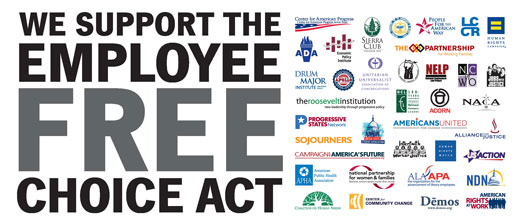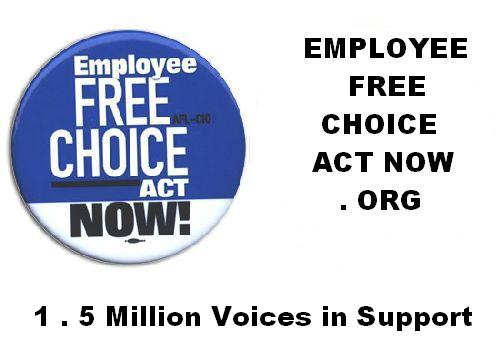From the Open-Publishing Calendar
From the Open-Publishing Newswire
Indybay Feature
A Closer Look at the Employee Free Choice Act
By now, most people have heard of the Employee Free Choice Act (EFCA), the bold legislative initiative introduced by the Democrats (Rep. George Miller, D-CA), intended to amend the National Labor Relations Act (NLRA) by making it easier and fairer for employees to join a labor union.

By DAVID MACARAY
Although the measure passed the House by a vote of 241 to 185, in June of 2007, and was approved by a 51-48 vote in the Senate, it failed to get the 60 votes necessary for cloture (which would have made it filibuster-proof), causing it to lie dormant for the remainder of the 110th Congress.
However, it should be noted that former President Bush had already promised to veto the legislation, so even with those 60 crucial Senate votes the bill would have emerged stillborn. To have any chance whatever of becoming law, it was clear that the EFCA would require a Democrat in the White House.
During the primaries, both Obama and Clinton loudly sang the praises of the EFCA (as they raked in organized labor's contributions) and promised, if elected, to fight for its passage. But because there have been signs that President Obama is hedging on that promise, it remains to be seen how hard he and his Congress-savvy chief of staff Rahm Emanuel will push for it. On one side, they have moderate Democrats terrified of provoking the Republicans; on the other, they have an aroused AFL-CIO applying pressure.
If enacted, EFCA would allow employees to circumvent the complex, time-consuming, and management-skewed NLRB certification process. Instead of a full-blown election, workers would have the choice of "card check," where all they have to do is sign cards indicating they wish to become union members. If a majority of the workforce signs such cards they instantly belong to a union.
Naturally, most businesses hate the idea of the streamlining the process. They object to anything that makes joining a union easier. Indeed, if it were their call, many businesses would prefer seeing unions made illegal or "state-run," as they are in the most repressive countries in the world. Accordingly, the U.S. Chamber of Commerce has spent millions lobbying against passage of the EFCA.
While card check is the most celebrated feature of the EFCA, there are two other provisions in this bill that are equally-if not more-important. Card check is an enormous advantage to unions, but it's not a "new" method. It's already used voluntarily by companies who feel they can either defeat the measure through anti-union propaganda, or believe there's benefit in being seen as "labor friendly."
But the two other features of this bill could be seen as labor milestones.
First, the EFCA will give the union the right to demand that the company begin contract negotiations within 10 days of certification. Ask any union organizers how hard it is to get that first contract, and they'll tell you that companies are notorious for dragging their feet-either by stalling interminably before sitting down with the union, or purposely prolonging the negotiations to the point where novice memberships get so antsy, they lose their nerve and ask for decertification. It happens.
However, under the EFCA, if the parties are unable to reach an agreement within 90 days, either side, union or management, can request that the Federal Mediation and Conciliation Service (FMCS) be brought in to mediate the bargain. Mediators already assist in contract bargains, particularly when strikes have been called or appear to be imminent, so having one present isn't innovative.
But here's the astonishing part: If the parties can't reach a mediated settlement within 30 days, the FMCS has the authority to finalize the contract. In effect, it would be binding arbitration. The notion of an outside party-a government agency, no less-setting the terms of a labor agreement would put the fear of God in management, causing them to do everything in their power to reach an equitable agreement. It's a profound improvement to the process.
Second, the EFCA would require the NLRB to seek an immediate injunction when there is "reasonable cause" to believe an employer has fired, suspended or harassed an employee for engaging in a union organizing or first contract drive. Moreover, an employer who is found guilty of illegally firing or suspending a union activist would be required to pay that employee three times his back pay-the amount of his lost wages, plus two times that sum in punitive damages-plus as much as $20,000 in civil fines.
So there it is. The EFCA will not only make card check a way of life, it will prevent companies who hope to avoid having to agree to a fair contract from stalling or playing mind games at the bargaining table, and will stop (or seriously curtail) management from illegally thwarting union activism in the workplace.
It's no wonder the Republican Party, House Majority Leader Adam Hasner (R-Delray Beach) Sen. Garrett Richter(R-Naples), Senator Richard Burr, U.S. Representative Howard Coble , The Coalition for a Democratic Workplace, the U.S. Chamber of Commerce and other corporate front groups are going ape-**** over this. Arguably, the EFCA would be the first big-time pro-labor legislation to come down the pike since the 1935 Wagner Act. Now it's up to Obama and the Democrats to step up to the plate and get it done.
For More Information on EFCA please visit our websites and blog
http://www.employeefreechoiceactnow.org
http://efcanow.blogspot.com/
http://efcaunionbustingclub.blogspot.com/
http://www.FreeChoiceActNow.Org
http://www.LaborUnionResources.Org
Tags: Employee Free Choice Act, EFCA, The Coalition for a Democratic Workplace, Republican Party, House Majority Leader Adam Hasner, Sen. Garrett Richter, Senator Richard Burr, Representative Howard Coble , Card Check Bill, Labor Unions, labor union news, Free Choice Act, Union Busting, Union Avoidance, Chamber of Commerce
Although the measure passed the House by a vote of 241 to 185, in June of 2007, and was approved by a 51-48 vote in the Senate, it failed to get the 60 votes necessary for cloture (which would have made it filibuster-proof), causing it to lie dormant for the remainder of the 110th Congress.
However, it should be noted that former President Bush had already promised to veto the legislation, so even with those 60 crucial Senate votes the bill would have emerged stillborn. To have any chance whatever of becoming law, it was clear that the EFCA would require a Democrat in the White House.
During the primaries, both Obama and Clinton loudly sang the praises of the EFCA (as they raked in organized labor's contributions) and promised, if elected, to fight for its passage. But because there have been signs that President Obama is hedging on that promise, it remains to be seen how hard he and his Congress-savvy chief of staff Rahm Emanuel will push for it. On one side, they have moderate Democrats terrified of provoking the Republicans; on the other, they have an aroused AFL-CIO applying pressure.
If enacted, EFCA would allow employees to circumvent the complex, time-consuming, and management-skewed NLRB certification process. Instead of a full-blown election, workers would have the choice of "card check," where all they have to do is sign cards indicating they wish to become union members. If a majority of the workforce signs such cards they instantly belong to a union.
Naturally, most businesses hate the idea of the streamlining the process. They object to anything that makes joining a union easier. Indeed, if it were their call, many businesses would prefer seeing unions made illegal or "state-run," as they are in the most repressive countries in the world. Accordingly, the U.S. Chamber of Commerce has spent millions lobbying against passage of the EFCA.
While card check is the most celebrated feature of the EFCA, there are two other provisions in this bill that are equally-if not more-important. Card check is an enormous advantage to unions, but it's not a "new" method. It's already used voluntarily by companies who feel they can either defeat the measure through anti-union propaganda, or believe there's benefit in being seen as "labor friendly."
But the two other features of this bill could be seen as labor milestones.
First, the EFCA will give the union the right to demand that the company begin contract negotiations within 10 days of certification. Ask any union organizers how hard it is to get that first contract, and they'll tell you that companies are notorious for dragging their feet-either by stalling interminably before sitting down with the union, or purposely prolonging the negotiations to the point where novice memberships get so antsy, they lose their nerve and ask for decertification. It happens.
However, under the EFCA, if the parties are unable to reach an agreement within 90 days, either side, union or management, can request that the Federal Mediation and Conciliation Service (FMCS) be brought in to mediate the bargain. Mediators already assist in contract bargains, particularly when strikes have been called or appear to be imminent, so having one present isn't innovative.
But here's the astonishing part: If the parties can't reach a mediated settlement within 30 days, the FMCS has the authority to finalize the contract. In effect, it would be binding arbitration. The notion of an outside party-a government agency, no less-setting the terms of a labor agreement would put the fear of God in management, causing them to do everything in their power to reach an equitable agreement. It's a profound improvement to the process.
Second, the EFCA would require the NLRB to seek an immediate injunction when there is "reasonable cause" to believe an employer has fired, suspended or harassed an employee for engaging in a union organizing or first contract drive. Moreover, an employer who is found guilty of illegally firing or suspending a union activist would be required to pay that employee three times his back pay-the amount of his lost wages, plus two times that sum in punitive damages-plus as much as $20,000 in civil fines.
So there it is. The EFCA will not only make card check a way of life, it will prevent companies who hope to avoid having to agree to a fair contract from stalling or playing mind games at the bargaining table, and will stop (or seriously curtail) management from illegally thwarting union activism in the workplace.
It's no wonder the Republican Party, House Majority Leader Adam Hasner (R-Delray Beach) Sen. Garrett Richter(R-Naples), Senator Richard Burr, U.S. Representative Howard Coble , The Coalition for a Democratic Workplace, the U.S. Chamber of Commerce and other corporate front groups are going ape-**** over this. Arguably, the EFCA would be the first big-time pro-labor legislation to come down the pike since the 1935 Wagner Act. Now it's up to Obama and the Democrats to step up to the plate and get it done.
For More Information on EFCA please visit our websites and blog
http://www.employeefreechoiceactnow.org
http://efcanow.blogspot.com/
http://efcaunionbustingclub.blogspot.com/
http://www.FreeChoiceActNow.Org
http://www.LaborUnionResources.Org
Tags: Employee Free Choice Act, EFCA, The Coalition for a Democratic Workplace, Republican Party, House Majority Leader Adam Hasner, Sen. Garrett Richter, Senator Richard Burr, Representative Howard Coble , Card Check Bill, Labor Unions, labor union news, Free Choice Act, Union Busting, Union Avoidance, Chamber of Commerce


Add Your Comments
We are 100% volunteer and depend on your participation to sustain our efforts!
Get Involved
If you'd like to help with maintaining or developing the website, contact us.
Publish
Publish your stories and upcoming events on Indybay.
Topics
More
Search Indybay's Archives
Advanced Search
►
▼
IMC Network


